Where the Wild Rose Blooms Read online
Cover by Terry Dugan Design, Minneapolis, Minnesota
Cover photo © Art Wolfe/The Image Bank/Getty Images
This is a work of fiction. Names, characters, places, and incidents are products of the author’s imagination or are used fictitiously. Any resemblance to actual persons, living or dead, or to events or locales, is entirely coincidental.
WHERE THE WILD ROSE BLOOMS
Copyright © 1996 by Lori Wick
Published by Harvest House Publishers
Eugene, Oregon 97402
www.harvesthousepublishers.com
Library of Congress Cataloging-in-Publication Data
Wick, Lori.
Where the wild rose blooms / Lori Wick.
p. cm. — (Rocky Mountain memories series ; 1)
ISBN-13: 978-0-7369-1818-3
ISBN-10: 0-7369-1818-3
1. Frontier and pioneer life—Rocky Mountains Region—Fiction. 2. Manwoman relationships—Rocky Mountains Region—Fiction. I. Title. II. Series: Wick, Lori. Rocky Mountain memories series ; 1.
PS3573.I237W485 1996
813'.54—dc20
95-36086
CIP
All rights reserved. No part of this publication may be reproduced, stored in a retrieval system, or transmitted in any form or by any means—electronic, mechanical, digital, photocopy, recording, or any other—except for brief quotations in printed reviews, without the prior permission of the publisher.
Printed in the United States of America
06 07 08 09 10 11 12 13 / BC / 10 9 8 7 6 5 4 3 2 1
To Diane Barsness, an old and new friend.
How far we’ve come because of God’s grace.
I thank you, precious friend,
for your love and caring.
I trust that the future will bring
only continued growth and closeness.
I dedicate this book to you with my love.
Contents
Acknowledgments
Chapter 1
Chapter 2
Chapter 3
Chapter 4
Chapter 5
Chapter 6
Chapter 7
Chapter 8
Chapter 9
Chapter 10
Chapter 11
Chapter 12
Chapter 13
Chapter 14
Chapter 15
Chapter 16
Chapter 17
Chapter 18
Chapter 19
Chapter 20
Chapter 21
Chapter 22
Chapter 23
Chapter 24
Chapter 25
Chapter 26
Chapter 27
Chapter 28
Chapter 29
Chapter 30
Chapter 31
Chapter 32
Chapter 33
Chapter 34
Chapter 35
Chapter 36
Chapter 37
Chapter 38
Chapter 39
Chapter 40
Epilogue
About the Author
Books By Lori Wick
Harvest House Publishers Fiction for Every Taste and Interest
Acknowledgments
So much of my writing is done alone. My office is in the center of our home, but even though someone else is in the house, I am alone at the computer. I am the only one who knows where I want to go with the story and what I hope to project. However, there are many people who fill the rest of my world. On this page I would like to acknowledge just a few of them.
To my son, Tim. Thank you for the poem. It was my favorite during your fifth-grade year. Thank you for having a tender heart, warm smile, and marvelous sense of humor. I love the sound of your laugh.
To my friend and secretary, Mary Vesperman. I can’t imagine a more wonderful team. Thank you, Mary, for every jot and tittle, but most especially for being you.
To Harold and Norma Kolstad. Thank you for telling me your story. It was my strongest inspiration.
And finally to my husband, Bob. As imaginative as I am, I could not have dreamed of the joy I would know in our relationship. Even if my feelings were somehow cut in half, I would still be head-over-heels in love with you.
27 December 1872
Dear Morgan,
If this letter finds you, God has certainly heard my prayers. This year marks the third Christmas without my Clara, and even though this season is the most lonely, the rest of the year is not much better. The store here is profitable, enough for three families, but success is lonely when not shared.
I would very much enjoy seeing you and Adaline; in fact, I would like to present you with a business proposition. I have moved into the rooms above the store. I still have my home, but it’s too large and full of Clara. I do not know how business stands for you in Boston, so much changed with the war, but if you’ve a longing for change, a position and home await you here. I feel the years that separate us now more than ever, and I can’t continue on here—not on my own, feeling every one of my 63 years.
Many of the mine owners live here, so there is a school and a church, and as I stated before, business is good. Winter lasts for months, but spring is worth the wait. I do not want to paint a false picture. I work hard and the hours are long, but if you’ve fathered a bunch of strapping sons, the load will be light.
Enough of the sales talk. You now know where I stand. I send this with hopes that I will hear from you soon, even if you decline to join me. I do ask myself, however, how brothers could have become so separated. I hope you come, but even a letter from the only family I have left would be more than welcome.
Sincerely,
Mitchell Fontaine
Georgetown
Colorado Territory
Dear Mitchell,
We received your letter with great pleasure and are at this time making plans to join you. Look for Addy, the boys, and me sometime in July. We look forward to the change and business opportunity.
Until then,
Morgan Fontaine
Boston, Mass.
17 March 1873
1
Cut right out of the side of a mountain, Georgetown was filled with narrow streets and friendly businesses. The town of more than 3000 residents sat in a deep valley. Rocky-faced mountains, with just a sprinkling of pines, rose on three sides. The high elevation caused snow to remain on the tallest peaks even in midsummer. Amid the beauty, silver miners built shacks and moved equipment in to plumb the earth. Mine tailings made their own hills and valleys, looming dark and mysterious in the landscape.
Streets lined with houses ran north and south, east and west. Their colors ranged from white to more somber grays, with the occasional pink or bright-blue facade. Clear Creek, flowing fast and clear as its name, ran through the middle of town. Children of all ages loved to cross or stand on the wooden bridge that spanned it, its sides supported with heavy wood beams.
Clayton Taggart, a town local, waved to a few of the creekgazers as he stopped his wagon in front of the general store and climbed down. He rubbed the small of his back and then looped the horses’ reins over the hitching post. He’d been in the saddle for days, and the seat of the buckboard had not felt comfortable. However, his mother had a long list of supplies she needed from town. Milly, Clayton’s younger sister, was ill, or his mother would have come herself.
Clayton walked across the street to the barber shop, thinking, as he often did, that there must be an easier way to make a living. Land and mine surveyors were in demand, but they couldn’t live, like the mine owners, in town. A dream, one he’d had for years, flashed into his mind, but he forced the thought away. It was going to take more time, and he was going to have to be patient.<
br />
“Well now, Clay,” the barber greeted the 18-year-old warmly once he was inside the shop.
“Hello, Hap. Have you time for a cut?”
“The chair’s all yours.”
The regular crowd had gathered in the mismatched wooden chairs along one wall, some smoking and some reading the weekly news. They mumbled greetings as Clayton dropped his hat onto the hook by the door and took a seat in the huge barber chair. The striped drape billowed in the air as it swung around his frame and settled below his throat.
“Yer pa still out?” Hap wanted to know.
“Yeah. He’ll be back in a few days.”
“Musta been nice and cool in those hills,” Charlie Parks offered. He held a section of the paper in front of his nose, and Clayton only smiled. Georgetown itself was over 8500 feet in elevation, making the temperatures quite cool year round. However, it was true that the mine where Clayton had been working had been even cooler.
“It’s still a lot of hard work,” Clayton commented softly, but no one seemed to hear.
Hap snipped along for a time, working in silence, before Clayton asked, “So what’s new in town?” If someone didn’t talk to him, he was going to fall asleep.
“Well, now.” Hap seemed pleased. “Young Doc Edwardson broke his leg.”
“How’d he manage that?”
Hal gave a wheezy laugh before answering. “Him and the missus had a fight, and he went slamming out the back door after dark. Fell down all four steps and busted his leg good. Had to call his own pa to set the thing.”
Clayton was amused but sympathetic.
“Billy Roper and June Hawley have decided to get married, kinda suddenlike. Some say she’s in the family way.”
Clayton’s eyes in the mirror became very stern, and Hap cleared his throat and changed the subject.
“Mitch Fontaine’s brother and his family have moved into town.”
Something in Hap’s voice caused Clayton to study him closely, but the older man’s look gave nothing away.
“Yes, indeed,” he continued. “Name’s Morgan. Got a right pretty wife too.”
“Where’re they living?” Clayton’s curiosity got the best of him.
“In Mitch’s old place. Hey, you have been gone awhile, haven’t you, Clay?” Hap suddenly interjected.
“Six weeks.” Clayton’s deep voice was mild.
“I wonder that your mother didn’t tell you.”
“I just got in last night, Hap, and Milly’s sick.”
“Is she now? That’s a shame. Gonna miss the first day of school next week?”
“She’s hoping not.”
“Mitch’s havin’ a sale.” Charlie Parks’ voice once again drifted out from behind the paper.
“A sale?” Clayton asked skeptically.
“Yep,” Hap took up the ball. “First ever. Morgan told Charlie here they’re going to be moving some new stock in, so they’ve put old items on sale.”
Clayton almost shook his head but remembered Hap’s scissors just in time.
“All kinds of changes goin’ on over there. You planning to stop, Clay?”
“Yeah. Ma sent a list.”
There was a certain amount of rustling from the chairs against the wall, but Clayton took little notice. Hap was finished with his haircut and fussing about his neck and ears with a small brush. Clayton flipped a coin to the older man and went for his hat.
“Be sure and have the boys help you out when you get there,” Charlie interjected one last time, the paper still in place. To Clayton’s confusion, Hap and the other men howled with laughter.
“Yes, sir, Clay,” Hap nearly shouted. “Meet the whole family and be sure those boys help you with your load.” Rumbles of laughter still sounded from the chairs, but all Clayton did was shake his head.
“Thanks, Hap.”
The old man never heard him. Clayton exited to calls of advice and more laughter. He stepped off the boardwalk and into the dirt street and headed to the general store, wondering over Mitch Fontaine’s brother. Clayton didn’t think Georgetown had room for any more characters.
“Tag!” A voice rang out just as he reached the other side, and Clayton turned to wave at a friend. The other man was headed into the bank, so Clayton continued on his way. He stepped into Fontaine’s and, while the bell was still ringing in his ear, noticed the change. Not only were things rearranged, they looked cleaner and tidier, like in the days before Clara had fallen ill.
The store sported two front doors, one for hardware and the other for dry goods and groceries. Clayton’s list was for dry goods, but the smell of leather that beckoned from the adjoining door tempted him to check out the saddles and riding gear. Clayton’s thoughts were interrupted when Mitch greeted him.
“Well, Clay,” he said easily.
Clayton looked up to see the older man approaching. With him was a man who could only be his brother. He was younger, but the family resemblance was there.
“Hello, Mitch.” Clayton greeted him with a longtime familiarity.
“Good to see you, Clay. Meet my brother, Morgan,” Mitch added with great enthusiasm.
“Hello, sir,” the younger man said respectfully.
“Clay, was it?” Morgan asked.
“Yes. Clay Taggart.”
“Good to meet you, Clay. I’m Morgan Fontaine, and this,” he waited until a woman approached from down one of the aisles, “is my wife, Adaline.”
Clayton removed his hat. Hap may have exaggerated about the other things, but his estimation of a “right pretty wife” was more than true: Adaline Fontaine was a beauty.
She had come to stand with Morgan, and he performed the introductions. “Addy, this is Clay Taggart.”
“Hello, Mr. Taggart.” Her voice was rich and cultured.
“Hello, ma’am.”
“What can we do for you today?” she asked.
Clayton reached toward his breast pocket, and a moment later they started on the list he withdrew. Everything from sugar to sewing needles was piled on and around the counter. Mitch and Morgan did most of the work, and Clayton fell into conversation with Mrs. Fontaine. He learned they had just moved from Boston, and she learned that his was the only home past their own.
“Your mother must be Elaine.”
“Yes.”
“Please tell her how thankful we were for the baked goods she left at the house, and also apologize that I’ve not had time to come to see her. I do plan on it.”
“I’ll tell her, but there’s no rush to come. My sister is ill and it might be best if you wait.”
“I’m sorry to hear that. Is there anything we can do?”
“Actually, she’s on the road to recovery, but thank you for asking. I’m sure my mother would welcome a visit. Maybe sometime next week.”
“I’ll plan on that, Mr. Taggart.”
“Please call me Clay.”
“In that case, I’m Addy. I’ve noticed that people in town use first names, and to tell you the truth, I’m more comfortable with that.”
The two exchanged a companionable smile, and Morgan joined them.
“I think that’s everything, Mr. Taggart.”
“Please call me Clay.”
“Clay it is. I’ll start these out, shall I?” He lifted a sack. “Where are the boys?” Morgan suddenly asked Addy.
“In the storeroom,” she told him simply.
“Ed! Jack!” Morgan raised his voice to a shout. “Come out here.”
Clayton had just thrown a sack of oats onto one muscular shoulder when they appeared.
“Boys,” their father continued. “Help Mr. Taggart out with his things.”
Clayton couldn’t move. The boys were two of the most gorgeous females he’d ever laid eyes on. One was cute and the other was drop-dead beautiful. They weren’t very tall but already showed signs of lovely womanhood. They both had clean, starched-white aprons covering their dresses, which only worked to accentuate their dark blue eyes and mahogany-colored hair. C
layton knew he was gawking but couldn’t seem to help himself. He took in the amused gaze of one of the young women and still stared, but when his eyes swung to her beautiful sister, he saw only haughty disdain. Suddenly, Clayton’s amusement matched that of the first girl.
“Come on,” Morgan urged, and both girls lifted parcels and started toward the door. Clayton came behind them, his eyes on the girls’ hair, which they both wore long and shiny down their backs.
“Here you go,” Morgan spoke. “We’ll bring the rest out for you, Clay. We’ll only be a moment.”
Clayton was only too glad to stand and wait; it gave him a chance to get over his shock. Morgan Fontaine made one trip and said goodbye, as he had other customers to wait on, but the girls made two more trips. On the final load the lovelier of the girls tripped on a high board and almost fell on her face. That Clayton found this amusing was more than obvious.
She caught his laughing eyes, and he watched in fascination as her chin went into the air. She tossed her hair back with just the movement of her head, and her eyes flashed dark blue fire.
“A gentleman would never laugh,” she told him in a contemptuous tone.
Clayton’s smile only deepened. “Well, then, we both know where I stand.”
Anger covered her exquisite features before she turned away and returned to the building in a huff. Watching until she disappeared, Clayton’s eyes swung to the remaining sister. They grinned at one another.
“She doesn’t like you,” she said cheekily, and Clayton’s shoulders shook with silent laughter.
“She made that quite clear.” Clayton’s voice was deep. “Are you two really named Ed and Jack?”
“Edwina and Jacqueline. Eddie and Jackie to everyone but Father, who always wanted boys.”
“But he got girls,” Clayton clarified unnecessarily.
“Yes.” Her dimples were still in place. “Five of them.”
“Five?”
“Yes.”
They both laughed now, and when Clayton sobered he said, “Are you Jackie or Eddie?”
“I’m Eddie. Jackie is the one who doesn’t like you.”
Clayton only laughed again. “I wonder if I’ll be able to do anything about that.”
Eddie cocked her head to one side. “I think you probably could, but something tells me you won’t.”

 A Texas Sky
A Texas Sky The Rescue
The Rescue To Know Her by Name
To Know Her by Name Wings of the Morning
Wings of the Morning White Chocolate Moments
White Chocolate Moments Sean Donovan
Sean Donovan The Proposal
The Proposal Beyond the Picket Fence
Beyond the Picket Fence Every Little Thing About You
Every Little Thing About You City Girl
City Girl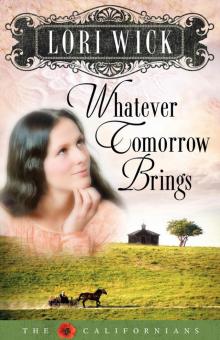 Whatever Tomorrow Brings
Whatever Tomorrow Brings A Gathering of Memories
A Gathering of Memories Just Above a Whisper
Just Above a Whisper Jessie
Jessie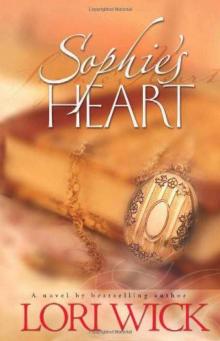 Sophie's Heart
Sophie's Heart Lori Wick Short Stories, Vol. 1: Be Careful With My Heart, the Haircut
Lori Wick Short Stories, Vol. 1: Be Careful With My Heart, the Haircut Cassidy
Cassidy The Long Road Home
The Long Road Home The Visitor
The Visitor Whispers of Moonlight
Whispers of Moonlight Who Brings Forth the Wind
Who Brings Forth the Wind Lori Wick Short Stories, Vol. 4: The Rancher's Lady
Lori Wick Short Stories, Vol. 4: The Rancher's Lady The Hawk and the Jewel
The Hawk and the Jewel Lori Wick Short Stories, Vol. 3: An Intense Man, the Camping Trip
Lori Wick Short Stories, Vol. 3: An Intense Man, the Camping Trip Leave a Candle Burning
Leave a Candle Burning Promise Me Tomorrow
Promise Me Tomorrow Bamboo & Lace
Bamboo & Lace Every Storm
Every Storm The Knight and the Dove
The Knight and the Dove The Princess
The Princess Lori Wick Short Stories, Vol. 2: Beyond the Picket Fence
Lori Wick Short Stories, Vol. 2: Beyond the Picket Fence A Song for Silas
A Song for Silas Pretense
Pretense Lori Wick Short Stories, Christmas Special
Lori Wick Short Stories, Christmas Special Where the Wild Rose Blooms
Where the Wild Rose Blooms The Princess Special Edition
The Princess Special Edition As Time Goes By
As Time Goes By Lori Wick Short Stories, Vol. 2
Lori Wick Short Stories, Vol. 2 Every Little Thing About You (Yellow Rose Trilogy 1)
Every Little Thing About You (Yellow Rose Trilogy 1)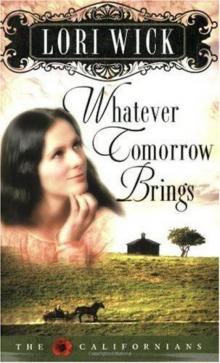 Whatever Tomorrow Brings (The Californians 1)
Whatever Tomorrow Brings (The Californians 1) The Hawk and the Jewel (Kensington Chronicles 1)
The Hawk and the Jewel (Kensington Chronicles 1) A Texas Sky (Yellow Rose Trilogy)
A Texas Sky (Yellow Rose Trilogy) Who Brings Forth the Wind (Kensington Chronicles)
Who Brings Forth the Wind (Kensington Chronicles)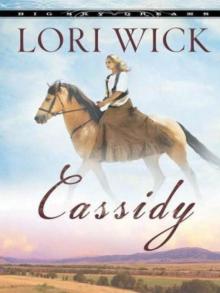 Cassidy (Big Sky Dreams 1)
Cassidy (Big Sky Dreams 1) Lori Wick Short Stories, Vol. 3
Lori Wick Short Stories, Vol. 3 Jessie (Big Sky Dreams 3)
Jessie (Big Sky Dreams 3) Sabrina (Big Sky Dreams 2)
Sabrina (Big Sky Dreams 2) Lori Wick Short Stories, Vol. 1
Lori Wick Short Stories, Vol. 1 Sabrina (Big Sky Dreams)
Sabrina (Big Sky Dreams) A Place Called Home (A Place Called Home)
A Place Called Home (A Place Called Home) City Girl (Yellow Rose Trilogy 3)
City Girl (Yellow Rose Trilogy 3)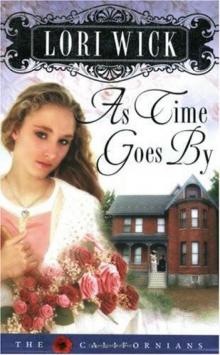 As Time Goes By (The Californians 2)
As Time Goes By (The Californians 2) A Place Called Home (A Place Called Home 1)
A Place Called Home (A Place Called Home 1) Lori Wick Short Stories, Vol. 4
Lori Wick Short Stories, Vol. 4 Wings of the Morning (Kensington Chronicles)
Wings of the Morning (Kensington Chronicles) Beyond the Picket Fence: And Other Short Stories
Beyond the Picket Fence: And Other Short Stories